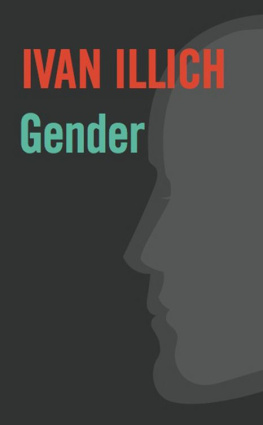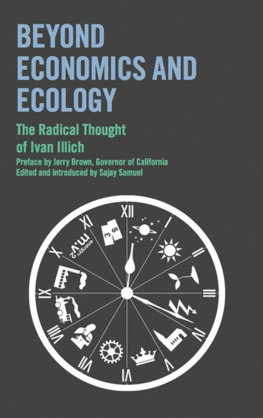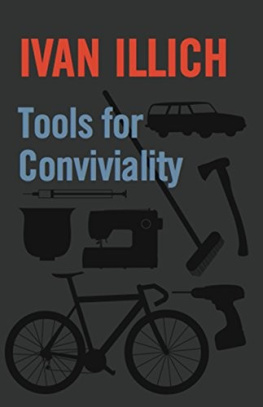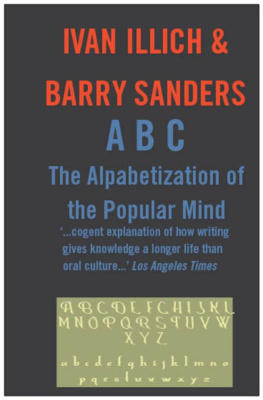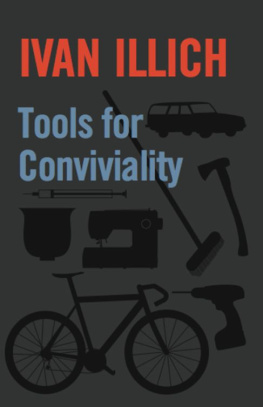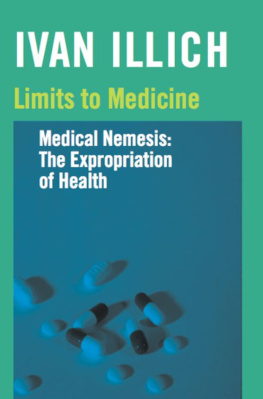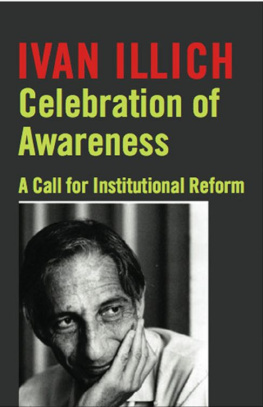The Rivers
North of the Future
ALSO BY DAVID CAYLEY
The Age of Ecology
Ivan Illich in Conversation
Northrop Frye in Conversation
George Grant in Conversation
The Expanding Prison
The Rivers
North of the Future
The Testament of Ivan Illich
as told to David Cayley
Foreword by
Charles Taylor

Copyright 2005 David Cayley
All rights reserved. No part of this publication may be reproduced or transmitted in any form or by any means, electronic or mechanical, including photocopying, recording, or any information storage and retrieval system, without permission in writing from the publisher.
Published in 2005 by
House of Anansi Press Inc.
110 Spadina Avenue, Suite 801
Toronto, ON M5V 2K4
Tel. 416-363-4343
Fax 416-363-1017
www.anansi.ca
Distributed in Canada by
HarperCollins Canada Ltd.
1995 Markham Road
Scarborough, ON MIB 5M8
Toll free tel. 1-800-387-0117 | Distributed in the United States by
Publishers Group West
1700 Fourth Street
Berkeley, CA 94710
Toll free tel. 1-800-788-3123 |
Permission is gratefully acknowledged to reprint excerpts from the following:
(p. vi) Muska Nagel, A VoiceTranslations of Selected Poems by Paul Celan (Puckerbrush Press, 1998). (The title of this book and p. vi) Paul Celan, In den Flssen, taken from: Paul Celan, Atemwende Suhrkamp Verlag, Frankfurt am Main, 1967. (pp. 4041) Maurice Merleau-Ponty, Eye and Mind, trans. Carleton Dallery, in The Primacy of Perception, ed. James M. Edie (Evanston: Northwestern University Press, 1964).
Every reasonable effort has been made to contact the holders of copyright for materials quoted in this work. The publishers will gladly receive information that will enable them to rectify any inadvertent errors or omissions in subsequent editions.
House of Anansi Press is committed to protecting our natural environment. As part of our efforts, this book is printed on New Leaf EcoBook 100 paper: it contains 100% post-consumer recycled fibres, is acid-free, and is processed chlorine-free.
13 12 11 10 09 4 5 6 7 8
LIBRARY AND ARCHIVES CANADA CATALOGUING IN PUBLICATION DATA
Illich, Ivan, 19262002.
The rivers north of the future : the testament of Ivan Illich/
edited by David Cayley.
Includes index.
ISBN 978-0-88784-714-1
1. Illich, Ivan, 19262002 Views on Christianity. 2. Illich, Ivan, 19262002 Views on technology. 3. Christianity Controversial literature. 4. Christianity Philosophy. I. Cayley, David II. Title.
BR85.I44 2004 230.01 C2004-905560-7
Cover design: Bill Douglas at The Bang
Cover art: Peter Schumann
Typesetting: Brian Panhuyzen

We acknowledge for their financial support of our publishing program the Canada Council for the Arts, the Ontario Arts Council, and the Government of Canada through the Book Publishing Industry Development Program (BPIDP).
Printed and bound in Canada
To Barbara Duden
Into the rivers north of the future
I cast out the net, that you
hesitantly burden with stone-engraved
shadows
Paul Celan
CONTENTS
FOREWORD
We all owe a debt to David Cayley for bringing to the public this statement of the core thinking of Ivan Illich. It is an understatement to say that those who have read the books for which Illich is best known, even those most enthused by them, have rarely seen into the rich and complex position which underlies them. But this position is extraordinarily fertile and illuminating. In a way, it sets some of our cherished commonplaces on their heads.
The place of Christianity in the rise of Western modernity has been under discussion for more than a century. Those who are sympathetic to religion tend, these days, to give it an important place, and those who are less so (such as Hans Blumenberg) tend to minimize its role. Thinkers with a basically favourable stance towards modernity see it as the realization of Christian ideals. Christian reactionaries who hate the modern world, in the tradition of Joseph de Maistre, define Christianity as its antithesis. But, either way, debate tends to be framed by certain familiar alternatives for or against modernity, for or against religion and these alternatives are mixed and matched in different combinations. Illich changes the very terms of the debate. For him, modernity is neither the fulfillment nor the antithesis of Christianity, but its perversion. The link between ancient religion and present reality is affirmed, but not necessarily to the benefit of either.
Illich, in this sense, is reminiscent of another great voice from the sidelines: Friedrich Nietzsche. Nietzsche also tried to transform the debate, but he found a Christian source for the things he most hated in modernity: equality, democracy, the concern for suffering. His picture of Christian faith was a caricature in which faith could not be distinguished from its perversions. Illich, on the other hand, speaks as a man of faith. (Certain modern Nietzscheans, in particular Michel Foucault, raise many of the same issues as Illich, however.)
Illich argues that Western modernity finds its original impetus in a mutation of Latin Christendom, a mutation in which the Church began to take with ultimate seriousness its power to shape and form people to the demands of the Gospel. I had been working for a number of years on a project to account for the rise of secular civilization, and the basic thesis of my account was similar to Illichs. But I had no idea of the parallels until David Cayley brought Illichs thought to public attention in a radio series a few years ago. This helped both to inspire and to refocus my efforts.
What I call a mutation in Latin Christendom could be described as an attempt to make over the lives of Christians and their social order, so as to make them conform thoroughly to the demands of their faith. I am talking not of a particular, revolutionary moment, but of a long, ascending series of attempts to establish a Christian order, of which the Reformation is a key phase. As I see it, these attempts show a progressive impatience with older modes of religious life in which certain traditional collective, ritualistic forms coexisted uneasily with the demands of individual devotion and ethical reform which came from the higher revelations. In Latin Christendom, the attempt was made to impose on everyone a more individually committed and Christocentric religion of devotion and action, and to suppress or even abolish older, supposedly magical or superstitious forms of collective ritual practice.
Allied with a neo-Stoic outlook, this became the charter for a series of attempts to establish new forms of social order. These helped to reduce violence and disorder and to create populations of relatively pacific and productive artisans and peasants who were more and more induced/forced into the new forms of devotional practice and moral behaviour, be this in Protestant England, Holland, or later the American colonies, or in Counter-Reformation France, or in the Germany of the Polizeistaat.
This creation of a new, civilized, polite order succeeded beyond what its first originators could have hoped for, and this in turn led to a new reading of what a Christian order might be, one which was seen more and more in immanent terms. (The polite, civilized order
Next page

